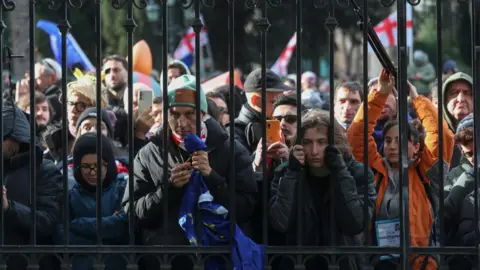
Introduction
Thousands of people have taken to the streets in Georgia to protest the inauguration of the new president. The protests erupted as the newly elected leader took office, sparking widespread demonstrations across the nation. This shows the growing political unrest in Georgia as citizens voice their opposition to the president’s policies and leadership.
Details of the Protests
The protests began shortly after the swearing-in ceremony. Demonstrators gathered in key areas of Georgia’s capital, Tbilisi, and other major cities. They chanted slogans calling for change and expressing dissatisfaction with the new president’s promises during the election campaign.
Many protesters are voicing concerns about political freedoms, corruption, and the country’s future direction. The political climate in Georgia has been tense for months, with the opposition accusing the president of being too closely aligned with powerful business interests and government elites.
Political Unrest and Growing Tensions
The political unrest in Georgia is not new. The country has faced similar demonstrations in recent years, often triggered by perceived injustice, government corruption, and a lack of transparency. Despite the government’s assurances of reform, many citizens feel that the status quo has not changed, leading to frustrations boiling over in public protests.
Analysts argue that the protests reflect a deeper issue in Georgian politics: a growing divide between the people and the ruling elite. These tensions, now manifested in large-scale protests, suggest that the new president’s administration may struggle to unite the country, particularly with the opposition forces in the streets.
Response from Authorities
The Georgian authorities have responded to the protests with a heavy police presence. Security forces have been deployed to maintain order and prevent violence during the demonstrations. However, this has only escalated tensions, with reports of clashes between protesters and law enforcement.
The government has called for calm, urging protesters to voice their concerns peacefully. Still, the situation remains volatile, with both sides digging in their heels. The president has made it clear that he will not back down on his policy agenda, despite the vocal opposition.
International Reactions
The protests in Georgia have drawn international attention. Many foreign governments and human rights organizations are closely monitoring the situation. Some have expressed concern over the use of force against protesters, while others have called for dialogue and peaceful resolution.
Georgian leaders are under increasing pressure from the international community to address the political crisis without resorting to violence. With Georgia’s strategic position in the Caucasus region, the international community is watching closely, as instability in the country could have broader regional implications.
The Road Ahead
As the protests continue, Georgia faces an uncertain future. The country is at a crossroads, with its political landscape divided and citizens increasingly disillusioned with the leadership. Whether the president can calm the unrest or whether protests will intensify remains to be seen.
For now, the streets of Tbilisi and other cities are filled with people demanding change. The road to political stability in Georgia will depend on the willingness of both the government and the opposition to engage in meaningful dialogue and compromise.

